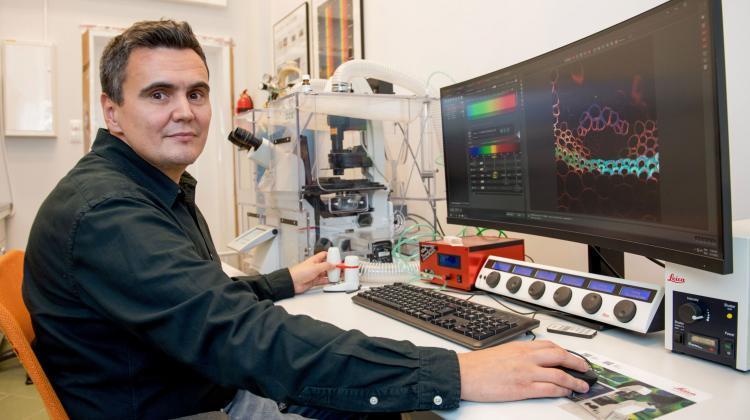Major Breakthrough in Battle against COVID-19
 Professor Marcin Drąg from the Faculty of Chemistry of the Wrocław University of Technology. Credit: PAP/ Maciej Kulczyński 07.11.2019
Professor Marcin Drąg from the Faculty of Chemistry of the Wrocław University of Technology. Credit: PAP/ Maciej Kulczyński 07.11.2019
Scientists in Wrocław say they have made a major breakthrough in finding a vaccine for COVID-19 after cracking the enzyme - SARS-CoV-2 Mpro protease, which may be crucial in the fight against the SARS-CoV-2 coronavirus.
Professor Marcin Drąg and his team from the Wrocław University of Technology say that the discovery of another key SARS-CoV-2 virus very similar to the enzyme known from SARS-CoV-1, means that research carried out on this enzyme can be used to look for a COVID-19 drug.
Professor Drąg said: “The coronavirus that causes COVID-19 has two proteases. Stopping either of them stops virus replication completely. This is confirmed medical data. And we are the only laboratory in the world that now has both of these proteases in an active form and well profiled.”
SARS-CoV-2 is a close cousin of the SARS-CoV-1 virus, which caused the SARS epidemic in 2002. At that time, many groups around the world were working on understanding this virus. However, until the mechanisms of action of the virus causing COVID-19 are understood, it is not known which SARS research can be used directly, for example in the research on a new drug or retargeting (searching for new applications) of already known drugs.
Drąg said: “We have now been able to compare PLpro proteases from the 'old' and the 'new' SARS-CoV viruses. We have shown that they are very similar in the specificity of substrate binding, and this is key information in terms of their activity. This means that all information obtained over many years of research on the previous SARS can be immediately used in SARS-CoV-2 research.”
SARS-CoV-2 consists of 29 different proteins, including two proteases: SARS-CoV-Mpro and SARS-CoV-2-PLpro. Proteases are considered to be a difficult but very good target for drugs. For example, some HIV, hepatitis C, type 2 diabetes mellitus and new generation anti-cancer drugs are based on proteases.
The SARS-Cov-2-PLpro protease studied by Professor Drąg is not only necessary for virus replication, but also blocks the body's defence mechanism against this pathogen. This enzyme stops the mechanisms leading to the death of the infected cell.
He said: “Coronavirus uses the enzyme to deceive human cells, and can thus replicate and create a huge number of copies,” adding that blocking this protein could help the body fight the virus.
An article with the research results is under review, but the publication preprint is available to everyone online free of charge.
Several research groups from the US also participated in the research on SARS-Cov-2-PLpro. In addition to the group of Professor Shaun Olsena (Medical University of South Carolina/University of Texas Health Science Center at San Antonio), they were Professor Tony Huang and Dr. Miklos Bekes (New York University School of Medicine) and Scott Snipas (Sanford Burnham Prebys Medical Discovery Institute, California).
PAP - Science in Poland, Ludwika Tomala
lt/ ekr/ kap/
tr. RL
Przed dodaniem komentarza prosimy o zapoznanie z Regulaminem forum serwisu Nauka w Polsce.



















